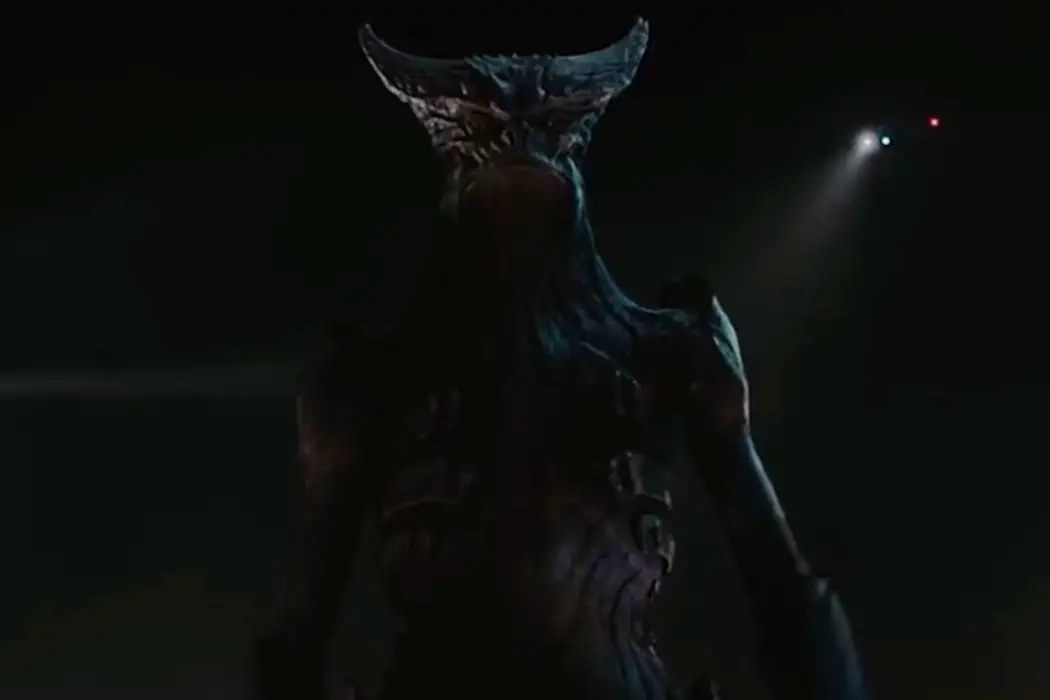COLOSSAL: Anne Hathaway Towers Over An Uneven Landscape

David is a film aficionado from Colchester, Connecticut. He enjoys…
Fantasy-infused films have long fascinated me. Fiction has the ability to harness the bizarre and to intertwine it as a core piece of a narrative, a concept known as magical realism. Rather than fight the logistical impossibility of the situation, the characters, in addition to the audience watching, simply suspend their disbelief and accept it as the real world. Such a concept is imbued in some of the greatest films: The Wizard of Oz, Groundhog Day, Harvey, to name a few.
In Colossal, this concept forms the central basis for the film, with the plot consisting of a woman who is somehow able to conjure a kaiju monster located halfway around the world simply by walking through a park at a certain time. It is a brilliantly clever and original concept, and is often orchestrated with a great deal of humor; the film which surrounds it, though, is also marred by a series of glaring flaws.
A Fun Twist on the Kaiju Film
Colossal is about a woman named Gloria (Anne Hathaway), who is kicked out of an apartment in New York City by her boyfriend Tim (Dan Stevens), due to not only being unemployed for an extended period of time, but engaging in frequent all-night drinking binges. She subsequently moves into her family’s upstate suburban home, where she runs into an old elementary school friend named Oscar (Jason Sudeikis). Realizing her situation, Oscar decides to help Gloria out by giving her part-time work at his bar.
Soon after settling into this new life, though, Gloria hears news of a gigantic kaiju monster which somehow appeared one morning over Seoul, South Korea, leveling part of the city and costing a great many lives. Strangely enough, it seems to happen at the same time each day, and is also making similar gestures to what Gloria had been making at that time while crossing a neighborhood park. Gloria soon discovers that, by some strange phenomena, the monster is actually manifested by her. By treading through the same park each morning at the same time (8:05 AM, to be exact), she is able to conjure up the mysterious monster halfway around the world, and is completely at a loss as to how this happens.

Both written and directed by Nacho Vigalondo, one has to wonder just how he was able to come up with such an outlandish concept for a movie. And yet, though at first jarring due to its inherent bizarreness, the film works, mostly due to the fantasy element being played not only pointedly straightforward, but also with such a goofy, lighthearted tone. When we first discover where the monster comes from, and afterwards see Gloria miming its motions, it’s easy to get caught up in the hilarity. After all, who can possibly keep a straight face while watching a giant kaiju monster doing a grind-style dance?
The monster itself may be unimpressively animated, but perhaps this is intentional as well. The film as a whole is meant to be taken lightly, perhaps as a direct poke to all the somber-toned kaiju films that have premiered in the past, with Colossal being one of the only ones (with the possible exception of Pacific Rim) that just lets loose and has fun with its premise.
Yet Short-Lived
Soon after Gloria discovers her hidden talent, we discover an additional undisclosed detail about the monster, which then has unexpected consequences. It’s an aspect that was thankfully not ruined in the film’s promotions, and I won’t spoil it here either, but the one important detail to note is that it turns the film on its head, taking the once cheery concept and making it quite dismal (not that a giant monster destroying Seoul, South Korea is the most lighthearted subject in the first place). Yet, as dark humor, it worked.
The real issue here is not that Colossal switches tones, it’s how abruptly it does so. If the film had spent more time on transitioning between its two polar halves, perhaps it wouldn’t necessarily be an issue; yet, as it is, it is mere moments between the two, not nearly enough to keep you invested. In addition, several of the characters either completely change their behavior with little warning, or instead are shoved to the sidelines, with nary a word to say for the remainder of the film. There is one character, for example (played by Austin Stowell), who simply acts as a catalyst for the film’s events, but then retreats into obscurity. There are also a few scenes that play on for far too long, including one in particular involving an over-sized firecracker, which becomes quite excruciating to sit through.
Where Colossal eventually heads to by its conclusion is its saving grace; in getting there, though, there is a great deal of unnecessary and often ill-spirited excess that acts as a standing obstacle. It’s an unfortunate choice by Nacho Vigalondo, as it keeps the film somewhat shy of greatness.
Anne Hathaway Saves the Day
This is, by and large (no pun intended), Anne Hathaway‘s film. Living for many years in the “Hollywood’s Most Hated” category, she has often been overshadowed by many of her peers, with her last major hit being Interstellar from nearly three years ago. Yet, I never quite understood the hate. Since her first major hit The Princess Diaries, I always enjoyed seeing Hathaway on screen, with her varying dynamic personas from roles as diverse as Fantine in Les Misérables to Selina Kyle in The Dark Knight Rises.

Colossal is further proof of her range. Hathaway‘s Gloria is a mess, often airy and chaotic in nature, yet it’s hard not to love her all the same, due to her infectious quirks and spunky attitude. Though possessing a clear drinking problem and with little direction for life, it’s also hard not to trust that she will eventually land on her feet. It’s part of what makes her sympathetic as a protagonist, and, further, what makes the film’s ultimate takeaway so effective.
Monster as Metaphor
From the get-go, it’s not too difficult to surmise that the monster in Colossal stands for something greater. It’s the very purpose of fantastical elements in film: to be a manifestation of an unseen quality of a character, which ultimately leads them to a wider understanding of themselves by the film’s conclusion.
Here, the monster clearly represents the strong inner fortitude of Gloria, a quality that she originally was unaware that she possessed due to her treatment by people around her, specifically by men. Her ex-boyfriend Tim, for example, as opposed to trusting in Gloria to pick herself up after losing her job, instead casts her out, demeaning her in the process by even packing up her things and asking her to leave before he gets home from work that day. It is soon after this that she discovers her ability to become a monster, possessing this unwieldy power that she never before knew she had.

As the film progresses, though, this dynamic soon starts to shift in relation to yet another person around her, who then starts to use this power against her. No matter how many times Gloria tries to pick herself up, there’s always someone there to push her down again. Despite this, she remains steadfast, deciding to make a spontaneous yet daring choice, leading to the film’s climactic outcome.
Though still very much in the world of fantasy, the conclusion of Nacho Vigalondo’s film is one brimming with symbolical significance, with themes varying in range from overcoming alcoholism to affirming one’s individuality to the very clear pro-feminist agenda that the final scene instills (further helped with the uplifting sounds of Bear McCreary‘s empowering score). It’s quite remarkable, when you think about it; the fact that these themes are as effective as they are given that Colossal is really just about a remotely controlled kaiju monster.
Conclusion
Really, though, you can say that about most fantasy-oriented films, the fact that they can be deeply meaningful despite far-out premises. After all, the premise of Colossal is a woman that discovers her ability to make a gigantic monster appear halfway around the world upon walking through a park in her hometown at 8:05 AM each morning.
Yet, it’s also about much more than that – it’s about the strength of individual will despite opposing forces, the debilitating effects of alcoholism on a person’s motivation and personality, and, ultimately about finding oneself despite the lengths you have to go to in order to achieve it. Combine this with a fantastic and undeniably lovable performance by Anne Hathaway, and you’ve got a praiseworthy film to enjoy. Colossal may be flawed, but it’s rare to find a film this original in today’s rather bland and monotonous movie landscape.
What did you think of Colossal? What are some of your favorite fantasy-oriented films? Tell us in the comments below!
Colossal was released in the US on April 7 and will be released in the UK on May 19. For all international release dates, click here.
Does content like this matter to you?
Become a Member and support film journalism. Unlock access to all of Film Inquiry`s great articles. Join a community of like-minded readers who are passionate about cinema - get access to our private members Network, give back to independent filmmakers, and more.
David is a film aficionado from Colchester, Connecticut. He enjoys writing, reading, analyzing, and of course, watching movies. His favorite genres are westerns, crime dramas, horror, and sci-fis. He also enjoys binge-watching TV shows on Netflix.













